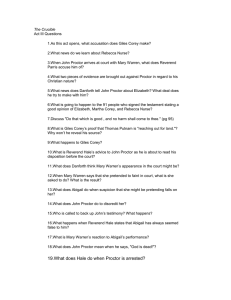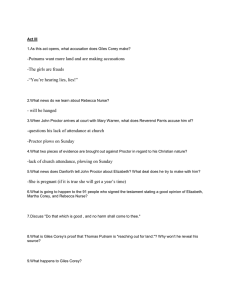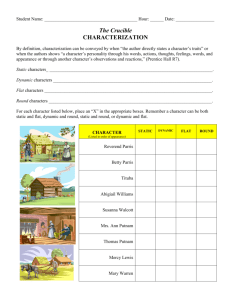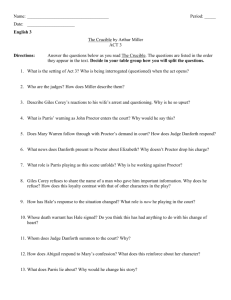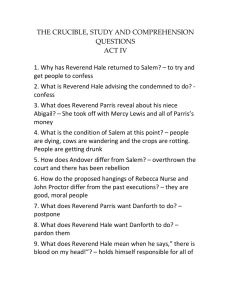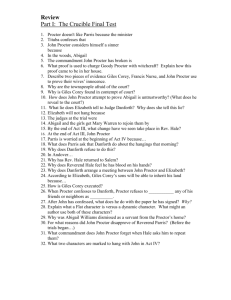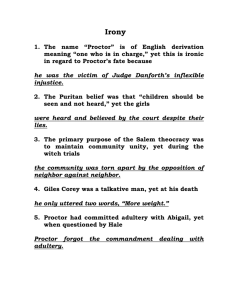Act IV Study Guide
advertisement
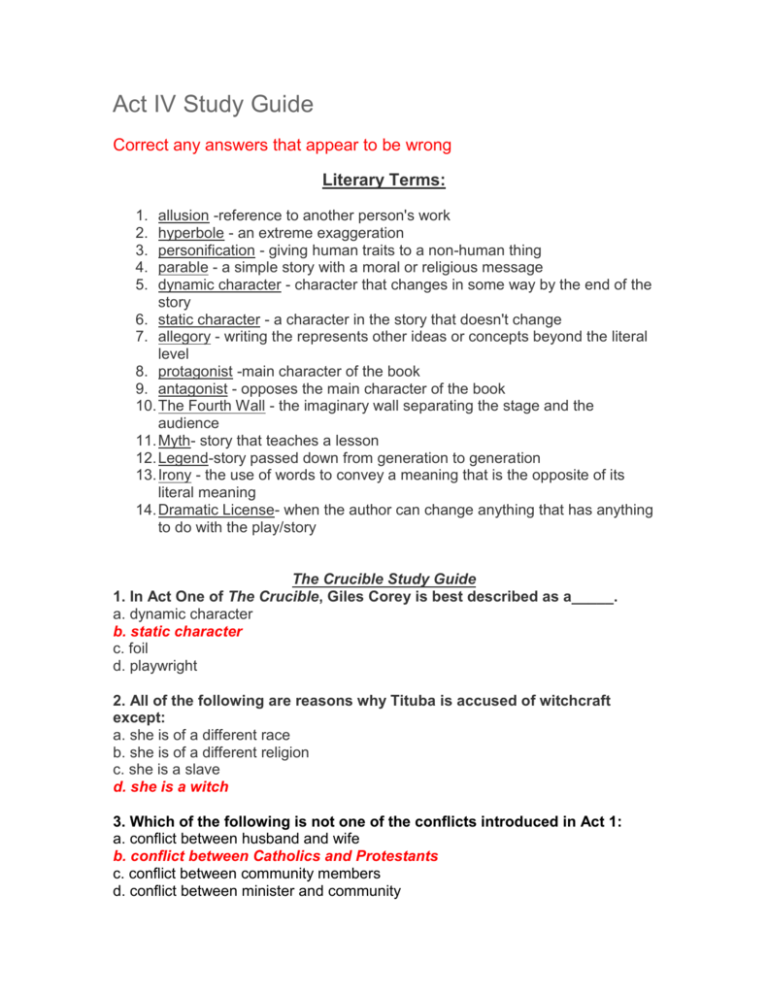
Act IV Study Guide Correct any answers that appear to be wrong Literary Terms: 1. 2. 3. 4. 5. allusion -reference to another person's work hyperbole - an extreme exaggeration personification - giving human traits to a non-human thing parable - a simple story with a moral or religious message dynamic character - character that changes in some way by the end of the story 6. static character - a character in the story that doesn't change 7. allegory - writing the represents other ideas or concepts beyond the literal level 8. protagonist -main character of the book 9. antagonist - opposes the main character of the book 10. The Fourth Wall - the imaginary wall separating the stage and the audience 11. Myth- story that teaches a lesson 12. Legend-story passed down from generation to generation 13. Irony - the use of words to convey a meaning that is the opposite of its literal meaning 14. Dramatic License- when the author can change anything that has anything to do with the play/story The Crucible Study Guide 1. In Act One of The Crucible, Giles Corey is best described as a_____. a. dynamic character b. static character c. foil d. playwright 2. All of the following are reasons why Tituba is accused of witchcraft except: a. she is of a different race b. she is of a different religion c. she is a slave d. she is a witch 3. Which of the following is not one of the conflicts introduced in Act 1: a. conflict between husband and wife b. conflict between Catholics and Protestants c. conflict between community members d. conflict between minister and community 4. Abigail could best be characterized as all of the following except: a. persuasive b. vindictive c. tentative d. competent 5. The word "loose" when Rebbecca Nurse says, "I hope you have decided not to go in search of loose spirits" most nearly means all of the following except: a. to let free b. not strict c. exact d. without restraints The Crucible Act IV Packet 1. What time of day does Act IV open? - night 2. Whose presence in the jail makes Danforth upset? - Reverend Hale 3. Cheever says that cows are running freely in the streets. Why are they roaming? - their owners are in jail 4. What object did Parris see as an intentional threat to his life? - dager 5. How many people have hanged already? - 12 6. Why does Danforth refuse to postpone any hangings? - doesn't want people to think that he's made a mistake 7. Who has been arrested and detained in the dungeon - John Proctor 8. Is Elizabeth really pregnant? - YES 9-12. Rev. Hale offers four signs that the town is being ruined. List them - 9. cattle roaming the highroads - 10. stink of rotting crops hangs everywhere - 11. orphans running door to door - 12. no man knows when the harlot's cry will end his life 13. Who is planning to hang when the sun rises in a few hours? - John Proctor 14. Does Rebecca confess to witchcraft? - no 15. Give two reasons why Giles Corey was smart for not admitting or denying the charges against him? - he were to die either way so he died the Christian way - his land will now go to his son's rather then out for sale 16. What were Giles Corey's dying words? - "more weight" 17. What does Proctor admit to? - Admitting to wanting to live 18. Why would Proctor admit, but not sign, a confession of his guilt? - he doesn't want his name put out for all to see, he thinks saying it is enough, doesn't want his name to justify murders 19. How does Proctor think danforth is using him? - use his name to justify murders 20. What finally happens to Proctor's confession? - he doesn't give them the paper with his signature instead he rips it up Actions Reveal Character Elizabeth- Cares more about her husband and her relationship with him than the morale of telling a simple lie or dying for honor. John Proctor- He is very prideful, and cares more about the fate of this situation and all those around him than his own life. Reverend Hale- Under the given circumstances, a simple lie is better than death Giles Corey- Stubborn, also prideful. Better for him to die with honor than to live a lie. Knew if he didn't admit or deny it his family could keep his land. He couldn't admit or deny it either because if he did then he would either be hung or be shunned from society Discovering Dramatic Plot Structure 1. Resolution 2. Exposition 3. Climax 4. Rising Action 5. Falling Action ALLS WELL THAT ENDS... - Reverend Parris: voted from office, walked out on the highroad, and never heard from again. - Tituba: released from jail, then later sold to another master - Abigail Williams: ran away, became a prostitute in Boston - John Proctor: Hung because he would not give Danforth his name signed on paper - Rebecca Nurse: hung for not confessing - Giles Corey: Stoned to death; last words were, "more weight." - Martha Corey: died from hanging - Reverend Hale: He goes off and writes a book criticizing the witch trials - Elizabeth Proctor: Married 4 years later and never hung
